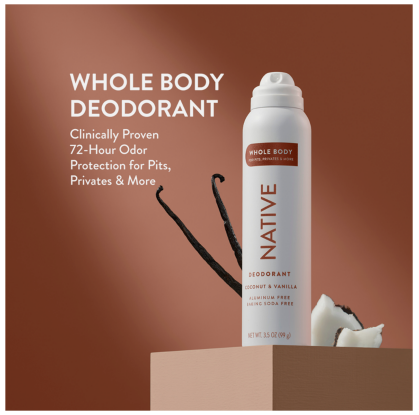Native Whole Body Deodorant Lawsuit Says 72-Hour Odor Protection Claim Is False [DISMISSED]
Last Updated on April 15, 2025
Hernandez et al. v. Zenlen, Inc.
Filed: June 26, 2024 ◆§ 1:24-cv-04846
A class action lawsuit alleges Native whole body deodorant is falsely advertised in that it cannot provide three days of odor protection.
New York
April 15, 2025 – Native Deodorant Lawsuit Dismissed
United States District Judge Denise L. Cote dismissed the proposed class action lawsuit detailed on this page on April 9, 2025.
Get class action lawsuit and settlement news sent to your inbox – sign up for ClassAction.org’s free weekly newsletter.
In a nine-page opinion and order, Judge Cote granted Zenlen’s motion to dismiss the plaintiff’s first amended complaint due to a lack of supporting evidence. Specifically, the plaintiff claimed the defendant had “never” clinically tested its Native whole body deodorant but failed to provide any facts in support of that conclusion, the judge found.
According to Judge Cote, the plaintiff even admitted in the complaint that Zenlen’s counsel produced a document purporting to reflect a Native deodorant clinical study. The plaintiff alleged that the testing methodology was “absurdly flawed,” but “[a] test, even if flawed, is still a test,” Judge Cote determined.
Learn all about the legal process: What is a class action lawsuit?
The maker of Native whole body deodorant faces a proposed class action lawsuit that alleges the product is falsely advertised in that it cannot provide three days of odor protection and has never been clinically tested.
Get class action lawsuit news sent to your inbox – sign up for ClassAction.org’s free weekly newsletter here.
The 19-page Native lawsuit accuses manufacturer Zenlen, Inc. of having “simply copied” the 72-hour odor protection claim from several other deodorants on the market while falsely adding that the product is “clinically proven”—and then charging “over 100% more than its competitors based on that false claim.”
In reality, no ingredient, or combination of ingredients, in the Native deodorant can produce the advertised results, the suit summarizes.

Per the complaint, the BBB National Programs' National Advertising Division has repeatedly stated that representations regarding whether a product has been “clinically proven” must closely match underlying scientific evidence that “establishes the truth of the claim,” as such a statement sends a strong message to consumers. The suit relays that shoppers are willing to pay a premium for natural deodorants scientifically proven to work as advertised, and manufacturers, the case says, “routinely mislead consumers” about the efficacy of their products.
The proposed class action alleges the success of the Unilever-owned Native whole body deodorant product line is “built on the lie” that the purportedly natural product is clinically proven to provide 72 hours of odor protection. The case contends that Native’s own instructions for use—namely that consumers should repeat applying the deodorant as needed throughout the day—further undercut the company’s 72-hour protection claim.
“In other words, Native makes the preposterous claim that it makes no difference how much of the spray a consumer uses and it should still provide 72-hour odor protection,” the suit reads. “However, the consumer may ‘repeat as needed throughout the day,’ which would no doubt be necessary considering that its ingredients have no lasting effect on odor.”
With regard to the product’s ingredients, the complaint shares that Native whole body deodorant is made with “denatured alcohol, fragrance, water, nitrogen, and dipropylene glycol.” According to the case, none of these ingredients, or any combination of them, has been proven to provide three days of odor protection.
“[T]here is no suggestion in any scientific literature that hand sanitizers or deodorants containing only denatured alcohol prevents bacterial formation for an entire day, much less three days. Water, of course, does not provide odor production [sic], and nitrogen is simply the spray propellant. Dipropylene glycol is merely a common solvent for delivering fragrances. Finally, there is no support in any scientific literature that a fragrance alone can prevent the accumulation of bacteria that causes body odor. All fragrance can do is help mask body odor by accompanying the natural body odor with a more pleasant scent, but it does not prevent body odor.”
Had consumers known that Native whole body deodorant was not clinically tested to provide 72 hours of odor protection, they would not have bought the product, or would have paid less for it, the case says.
The Native products lawsuit looks to cover all consumers who, within the applicable statute of limitations period, bought in New York Native whole body deodorant spray products warranted as “clinically proven to provide 72-hour odor protection.”
Are you owed unclaimed settlement money? Check out our class action rebates page full of open class action settlements.
Video Game Addiction Lawsuits
If your child suffers from video game addiction — including Fortnite addiction or Roblox addiction — you may be able to take legal action. Gamers 18 to 22 may also qualify.
Learn more:Video Game Addiction Lawsuit
Depo-Provera Lawsuits
Anyone who received Depo-Provera or Depo-Provera SubQ injections and has been diagnosed with meningioma, a type of brain tumor, may be able to take legal action.
Read more: Depo-Provera Lawsuit
How Do I Join a Class Action Lawsuit?
Did you know there's usually nothing you need to do to join, sign up for, or add your name to new class action lawsuits when they're initially filed?
Read more here: How Do I Join a Class Action Lawsuit?
Stay Current
Sign Up For
Our Newsletter
New cases and investigations, settlement deadlines, and news straight to your inbox.
Before commenting, please review our comment policy.